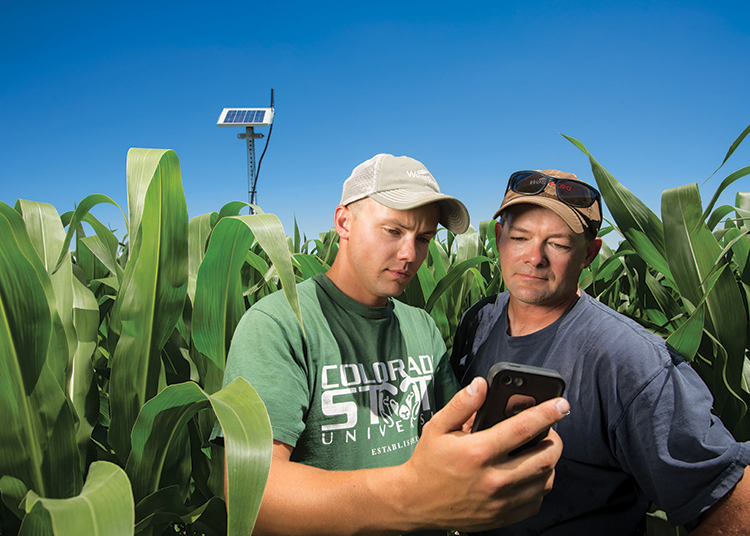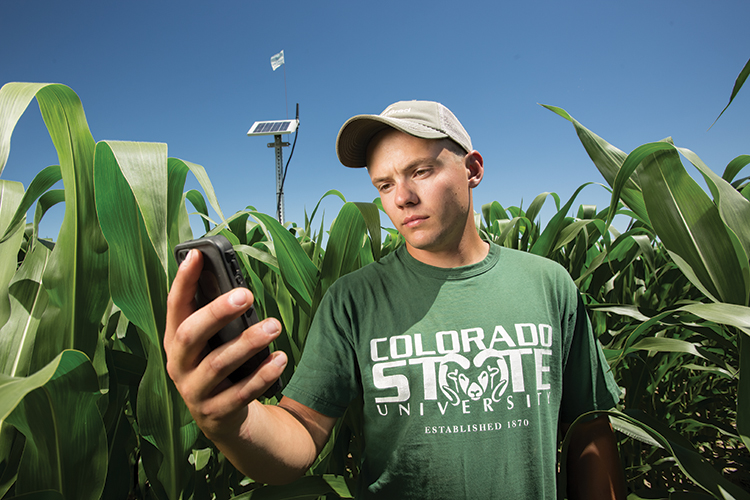Home > Colorado > Colorado Technology > Ag Technology is the Future of Farming In Colorado
Ag Technology is the Future of Farming In Colorado
In partnership with: Colorado Department of Agriculture

By embracing advances in agricultural technology, Centennial State farmers are maximizing production while minimizing their environmental impact – a true win-win situation. These growers and ranchers, many of whom are early tech adopters, are investing in tools that help them increase precision, save time and reduce stress, which often leads to higher-quality crops, more output and happier outlooks.
Conserving Water, Improving Yield
Founded in 1995, Marc Arnusch Farms currently comprises just over 2,600 irrigated acres and a small number of dryland acres that produce corn silage and alfalfa for the livestock market, as well as malt barley, wheat seed, grain corn and sugar beets. Although the Prospect Valley farm used to produce a larger variety of crops, owner Marc Arnusch says he and his team began to shift their focus from volume to value in 2003. “We aim to do things very site-specifically, precisely and sustainably in a way that will keep us profitable for years to come,” Arnusch says.
 In order to increase his crops’ value and improve efficiency, Arnusch has implemented advanced farming techniques in recent years. For example, he has installed solar-powered soil moisture probes in his fields to determine how much water his crops require at any given time. The probes send data to Arnusch’s mobile device, and he can easily and quickly see how the crops are making use of the water available in the soil.
In order to increase his crops’ value and improve efficiency, Arnusch has implemented advanced farming techniques in recent years. For example, he has installed solar-powered soil moisture probes in his fields to determine how much water his crops require at any given time. The probes send data to Arnusch’s mobile device, and he can easily and quickly see how the crops are making use of the water available in the soil.
“We’re getting inside the soil profile for the very first time,” Arnusch says. “It’s really a cool cross-section into the plant itself and how it’s behaving given the environment around it.”
Arnusch is confident sustainability will grow increasingly important in the agriculture sector – making precision technology a necessity.
“Sustainability will drive successful ag operations in the future,” Arnusch says. “Whether it’s managing our water resources, the soil health of our farmland or the economic survivability of our balance sheet, we all need to be working at a very precise and efficient level.”
![colorado dairy [INFOGRAPHIC]](https://eadn-wc01-4177395.nxedge.io/wp-content/uploads/2020/05/Screen-Shot-2016-11-16-at-11.20.40-AM.jpg)
Animal Care is Key
For the state’s dairy farmers, animal care is a top priority and that means modern milking equipment, advanced nutrition and expert veterinary care.
“I was raised to take great care of the animals on our farm because it is the right thing to do,” says Michelle Dickinson, a fourth- generation dairy farmer in Loveland. “I watched my dad care deeply for the cows for my whole life so when it became my turn to oversee their care, I knew I had a great responsibility to provide them the best life possible – complete with clean, dry bedding, the most nutritious feed and access to veterinary care regularly.”
Along with her husband and children, Dickinson operates Mountain View Farm with an eye on sustainability.
“Conserving our natural resources is always top of mind for our farm,” she says. “On our farm we re-use water several times so that not a drop goes to waste – first, the cows get access to the freshest, coldest water for drinking since they are our number one priority. Then, we use the water they don’t drink to clean out the barns or to water our crops. That way we are being smart about the limited supply of water we have here in Colorado.”



